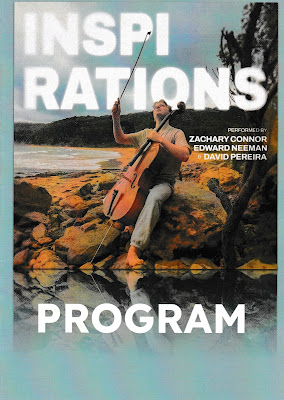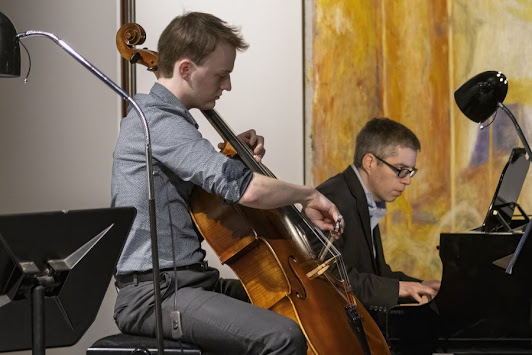Purcell’s Dido & Aeneas Reimagined
Canberra Qwire
Ellery String Quartet
Llewellyn Hall, June 28
Reviewed by Len Power
In an unexpected and bold move, the proudly LGBTIQA+ Canberra Qwire joined forces with the Ellery String Quartet and soloists to present Henry Purcell’s 17th century opera re-imagined in concert.
Inspired by certain lines in the text, the Qwire recast Dido as a male-identifying role, evoking Queer narrative exploration of the love of Dido, now King of Carthage, for Aeneas, Prince of Troy, with the Sorcerer plotting the destruction of Carthage and its king. The reimagination also placed the Sorcerer and his followers as metaphorical symbols of intolerance of the LGBTIQA+ community.
 |
| Oscar Balle-Bowness (Dido), Andrew Barrow (Aeneas) and Rachel Mink (Belinda) |
Dido was sung by Oscar Balle-Bowness, Aeneas by Andrew Barrow, Belinda by Rachel Mink and the Sorcerer by Alasdair Stretch. The Qwire fulfilled the role of the chorus, providing additional characters and narrative throughout the opera. The music was played very well by the Ellery String Quartet with Hugo Temby, continuo, Lizzy Collier, double bass and Jack Holmes, percussion. The musical director was Callum Tolhurst-Close.

Callum Tolhurst-Close (musical director)

Canberra Qwire, soloists and musical director, Callum Tolhurst-Close
As they took their bows at the end of the opera, the company
was given ecstatic and much-deserved applause by the large audience.
The opera ran for only an hour and, after an interval, the Qwire returned with a set of six songs including Earth Song by Frank Ticheli, Seasons of Love by Jonathan Larsen and And So It Goes by Billy Joel. Members of the Qwire introduced the songs, explaining why each song had special meaning for them.
The presentation of these modern songs was a change of pace from the opera, but the Qwire gave them the same highly polished standard of performance.
Photos by Peter Hislop
This
review was first published by Canberra CityNews digital edition on 21 June 2025.
Len Power's reviews are also broadcast on Artsound FM 92.7 in the ‘Arts Cafe’ and ‘Arts About’ programs.


























